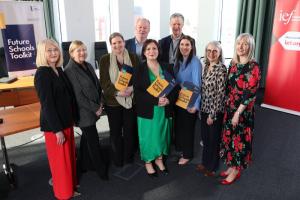
“The principle of support for parental choice should be maintained but should be subject to an imperative that increasingly all learners should learn together … The aim of all learners learning together should be energetically pursued.” The Independent Review of Education
A Future Schools Toolkit for post-primary schools has been developed by a research team from the School of Education, Ulster University, with the support of funding partner the Integrated Education Fund (IEF) to provide guidance that will enable schools and communities to undertake self-evaluation in relation to school sustainability. It also provides support to use the Community Conversation methodology to engage communities in exploring alternative options and sets out the pathways and processes involved in Area Planning. It has been designed to build a bridge between community voices and those who take policy decisions in relation to local provision of schools.
A Principal quoted in the Toolkit said: “We’ve got to be in charge of our own destiny as opposed to anything being imposed on anybody. So, I think the Toolkit will give a sense of security to any Board of Governors in any Area Planning aspect, which we’re all comfortable with in terms of how we move forward and change together… the Toolkit will be a very welcomed support mechanism for any Board of Governors and Trustees in terms of any change that’s to come. Every school should always have change as a focus in the priorities for their learning for the school development plan, because if you sit on your laurels thinking you’ve got it good, that’s when you’ll get a rude awakening…”
In recent times several schools, considered unsustainable against criteria set out by the Department of Education, have closed. This has led to concern in some communities that their local school may be at risk. The Future Schools project has been designed to support schools and communities who wish to explore whether there might be a more sustainable approach to post-primary school provision in their geographic area.
Dr Jessica Bates, Ulster University, added: “The Post-Primary Future Schools Toolkit does not seek to pre-determine a solution but aims to support and empower communities to explore alternative options for school provision and provide guidance on how they could move forward with this in practice. We are delighted to launch this Toolkit for Post Primary, which adds to our previous Future Schools Toolkit for Primary and our Community Conversations Toolkit. The three parts of the Toolkit may be worked through individually and / or sequentially depending on the specific circumstances.”
Paul Caskey OBE, Chief Executive of the IEF, said: “The IEF welcomes the publication of the Future Schools Toolkit for post-primary schools. The toolkit offers a practical way for communities to initiate conversations about the most sustainable model of education for their particular local area. We look forward to seeing schools and communities using this toolkit to create area-based solutions which will provide the best education for their young people.”
Further Info
The Future Schools Toolkit for Post-Primary is available online here: https://www.ulster.ac.uk/research/topic/education/our-research/current-research-projects/future-schools